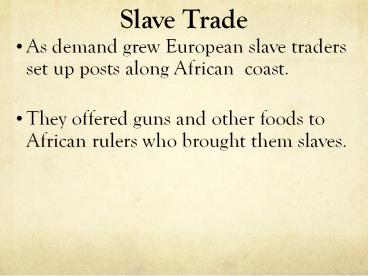Slave Trade PowerPoint PPT Presentation
Title: Slave Trade
1
Slave Trade
- As demand grew European slave traders set up
posts along African coast. - They offered guns and other foods to African
rulers who brought them slaves.
2
(No Transcript)
3
Slave Trade
- Spanish, Portuguese, Dutch, English, and French
all sent ships with slaves to America. - called Middle Passage-slaves were crammed into
small spaces below deck
4
(No Transcript)
5
Triangular Trade
- Colonial merchants developed many trade routes.
One route was known as the triangular trade. - Colonial merchants sometimes defied the
Navigation Acts by buying goods from the Dutch,
French, and Spanish West Indies.
6
(No Transcript)
7
Classes
- Gentry-wealthy planters, merchants, ministers,
successful lawyers, royal officials - Middle Class-farmers, skilled crafts workers,
some tradespeople - Lower Class-farmhands, indentured servantspeople
who signed contracts to work without wages in
return for their ocean passageand slaves
8
Education in Colonies
9
Home Learning
- Education began at home
- Boys learn male roles or jobs from their father
- Girls learn female roles from their mother
10
Apprenticeships
- Boys might serve as apprentices to learn a trade
or craft by living with a master and working for
free in return for training - This would start at age 10-13 and last until age
21 - The master had complete power over an apprentice
11
New England
- Massachusetts required all parents to teach their
children to read and understand the principles
of religion. - Massachusetts set up the first public schools, or
schools supported by taxes. - Evert town of over 50 families had to set up a
school. - The earliest schools had one room for students of
all ages.
12
Middle Colonies
- Churches and families set up private schools.
Only wealthy families could educate their
children.
13
Southern Colonies
- Some planters hired tutors, or private teachers.
Sons of the very wealthy went to school in
England. Slaves were usually denied education.
14
Higher Education
- Colleges sprang up for higher education such as
Harvard, Yale, Princeton (then called the College
of NJ), and the College of William and Mary in
Williamsburg.
15
Dame Schools
- Dame Schools-private schools run by women for
girls
16
Great Awakening
17
(No Transcript)
18
Great Awakening
- In the 1730s and 1740s, a religious movement
known as the Great Awakening swept through the
colonies. - began with powerful ministers.
- led many people to split from their old churches
and start new ones. - growth of so many churches forced people to be
more tolerant of different beliefs
19
Great Awakening
- New preachers argued that formal training was
less important than a heart filled with the holy
spirit. - If people could learn to worship on their own,
they could govern themselves. - People felt freer to challenge political
authority.
20
Enlightenment
- Benjamin Franklin demonstrated the spirit of the
Enlightenment. He used reason to invent useful
devices and improve his world.
21
Enlightenment
- City life encouraged the development of cultural
events, such as the theater and the growth of the
newspaper.
22
Enlightenment
- The Enlightenment was a movement started in
Europe by thinkers who applied reason and logic
instead of superstition to understand the world. - English philosopher John Locke wrote that people
could gain knowledge by observing and
experimenting. His words later on helped to
inspire Thomas Jefferson when he wrote the
Declaration of Independence

